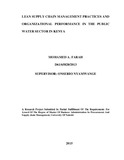| dc.description.abstract | In the competitive environment, most leading edge companies realized that by transferring costs either upstream or downstream, they are actually not increasing their competitiveness, since all costs ultimately make their way to consumers. Supply chain management guides firms to co-operate with a common goal to increase the overall channel sales and profitability, rather than competing for a bigger share of a fixed profit. One strategy for coordinating within and between firms with a focus on achieving efficiency, eliminating waste or overburden and creating value in products is the concept of lean management. The purpose of the study was to assess the lean supply chain management practices and organizational performance in the public water sector in Kenya. The variables under study were demand management practices, Waste management practices, Standardization practices and Behavioral practices. This study adopted a descriptive survey research design and both qualitative and quantitative data will be obtained for comparison purposes. The target population for the study was the 117 Water Service Providers (WSPs) which were linked to 8 regional Water Services Boards (WSBs) in charge of asset management through Service Provision Agreements (SPAs). In this study, primary data was collected by use of structured and closed ended questionnaire. Questionnaires were sent through the email to majority of the respondents and the researcher made phone calls to encourage the respondents to fill in the questionnaire and email back. The study established that demand management was concerned with balancing the requirement of internal and external customers with supply chain capabilities. The study also found out that the firm has small specialized plants rather than vertically integrated manufacturing facilities, the firm encourages doing the right thing the first time, the firm produces what is needed and no more (JIT) and that the firms production flow is smooth to dampen reaction waves that occur in response to schedule variations. The study concluded that the lean supply chain practices used by the public water companies in Kenya were demand management practices, waste management practices, standardization practices, behavioral practices, inspection activities and assurance activities. The study concluded that the companies have been embracing lean supply chain management strategies despite the challenges experienced form the internal and external environment. Lean supply chain management strategies have assisted the water companies to enhance their performance.. To gain competitive edge, public water companies in Kenya have no choice other than implementation of the lean strategies for survival. The study recommends that the companies should invest in time and money in collaborative demand planning, the firms should communicate its demand forecasts to its supply chain partners. The study recommends that the companies should practice the philosophy of grouping similar parts in families to eliminate movement and queue. The study recommends that the firm should have standardized and rationalized the range of materials, parts and consumables | en_US |

